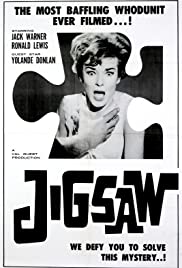
JIGSAW
UK, 1962, 97 minutes, Black and white.
Jack Warner, Ronald Lewis, Yolande Donlan, Michael Goodliffe, John Le Mesuirer, Moira Redmond, Brian Oulton, Ray Barrett, John Bradley.
Directed by Val Guest.
Jigsaw is one of the best examples of British police films during the 1950s and 60s. It was written by Val Guest who won awards for his screenplays for Hell is a City, The Day the World Caught Fire. Guest also directed the film which starred his wife, Yolande Donlan (and while both had been married before, they were married for 52 years until Guest’s death).
The setting is Brighton and the nearby town of Lewes. The opening shows a jigsaw on the table, a woman in bed, her appeal to her partner, then her being murdered.
Then there is a transition to a robbery }n a real estate agent, leases being stolen. The manager (Brian Oulton perfect as a most irritating critic of the police, and demanding) goes to one of the homes where the police discover the body by the woman, partly hacked.
The screenplay follows the detail of the police investigation in minute detail, the hard plod of investigation, checking sources and information, doublechecking, finding clues, following up, and relying on a bit of inspiration. The main officer is played by Jack Warner, archetypal actor of police roles from The Blue Lamp and its television spin-off, lasting for 20 years, Dixon of Dock Green. His assistant is played by Ronald Lewis. Yolande Donlan plays a lonely woman who is unwittingly caught in the case.
There are very good supporting roles especially for Michael Goodliffe as the chief suspect, John Le Mesurier in a cameo as an upset father, Ray Barrett is one of the police investigators.
The screenplay has some twists, many audiences recognising Michael Goodliffe from a distance early in the film and, therefore, the main suspect – but he is not the murderer. However, given the limited possibilities for suspects, audiences may spot the murderer earlier rather than later. However, the revelation scene works particularly well.
Allowing for the style of the times, this is a very good murder mystery, police investigation. (In fact, the original novel was set in the United States and here transferred to England.)
1. The title, the picture of the jigsaw puzzle on the table, the murder mystery and investigation as the piecing together of a jigsaw puzzle? The particular pieces, trying to find where they go, the final picture?
2. The setting is in Brighton, the town of Lewes, the home overlooking the water, the police precincts, the streets, location photography, authentic feel? The musical score?
3. The opening, the woman, her attachment to her partner, his turning on her, killing her? Hiding the body, the knives and the saw, cutting her head?
4. The real estate agent, his fussiness, demands on police, the police temptation to ignore him? His assistant and the information about the stolen leases? The visit to the house, the police searching house, the agent fussy about phone bills and costs, the discovery of the body?
5. The introduction to Fred Fellows, Jack Warner portraying a policeman and his expertise at this? Supported by Ronald Lewis? Handling the situation with the estate agent? Fellows and his wanting to go to the football? The murder case and his having to follow through? His methods, detail, experience, working with the officers, making demands on them? The search of the house, the suitcases and the initials, trying to identify the dead woman?
6. The various witnesses, the woman at the caravan park seeing the man, the delivery of the food at the house and the driver priding himself, his memory, the assistant at the estate agency? The interviews, their testimony? The lineups?
7. The footwork, the phoning of people with the initials on the suitcase, no leads? The piece of paper in the house, determining the writing, the address, the visit to Jean, her story, at home, embarrassed, her being overpowered and upset, the meeting with the man on the train, the attraction, going with him, at the house, his leaving? The latter being called, the moment of her recognising Tenby? Her dismay?
8. The range of police, their work, the demands, over time, doublechecking? Keeping vigil at houses, security?
9. Following the leads about the purchase of the knife and the saw? Records not kept?
10. The information about the young woman in Lewes, her name, the visit to her parents, the father angry and then upset, the patient mother? Her work at the airport, the name of the man and his sexual behaviour? His leaving? The follow-up to identify him?
11. The identification of the man at the house? His being interrogated, his denials? Suspicious? Taken in after the photos being found on his wall? His background of prison sentence with an underage girl? His being identified in the lineup? His confession, the explanation, the flashbacks, his being innocent?
12. The buildup to the climax, the witnesses arriving, Jean recognising Tenby?
13. His interrogation, his denials, statement about when he bought the saw and the knife and the reasons? The final moment, the public holidays Easter – and the exposure of Tenby’s lie?
14. A film made with British precision and detail, contrasting with equivalent American stories – although this story was originally set in the US?